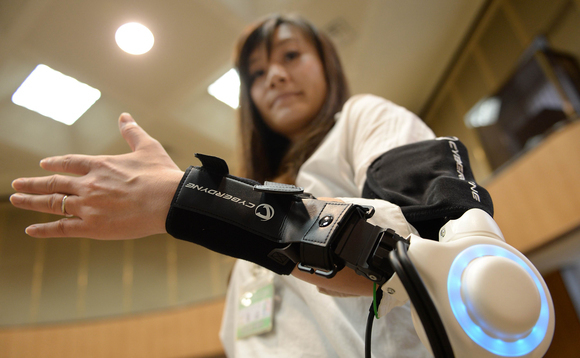
VC in Japan's universities: Getting schooled

For the past decade, Japan’s universities have been working with venture capital to commercialize their research. Recent developments in the public and private sectors suggest this relationship is evolving
Imagine you need a new kidney, but instead of having to wait for a donor and matching blood type, all you need do is push a button on a printer. It may sound like science fiction, but a start-up led by a group of scientists at University of Tokyo-based start-up Cyfuse is working to turn it into science fact - eventually.
The technology could change the world but the gulf between research paper and finished product is often huge, which means raising capital can be a challenge. The likes of Cyfuse need backing from with investors that not only have resources but also the patience to deal with university-initiated start-ups.
University of Tokyo Edge Capital (UTEC), which led Cyfuse's $4.8 million Series A round in early 2013, has spent the last decade trying to bridge this gap. Established by University of Tokyo in cooperation with the government's Ministry of Economy, Trade & Industry (METI), and supported by bevy of private companies and state-backed entities, its aim is to aid the commercialization of Japanese research.
UTEC is not alone. Other early-stage investors have spotted the opportunity presented by university spin-outs. The Series A also included Nissay Capital, Nippon venture Capital, and Industrial Growth Platform. Meanwhile, the Series B that took place in March saw a total of 12 investors, including the original four backers plus the likes of DBJ Capital and Jafco, commit $12 million.
This ecosystem appears to be growing. Recent legislative changes have also prompted universities to set up their own funds. Moreover, at least one new independent VCs - Tokyo's Beyond Next Ventures - has been set up to specifically target university spin-offs. But is the opportunity really that compelling?
Getting an edge
"The opportunity is interesting but it is also difficult to execute," says Shinichi Takamiya, a partner with Globis Capital Partners. "If an early-stage investor is able to carve out a technology and match it with a business, or if they have the capability to support the technology to commercialization, then it is compelling, but not just anyone can do it."
For that reason, earlier venture capital rounds in this space are dominated by the UTEC, which for a long time has been the only fund focusing purely on university start-ups, leveraging its exclusive relationship with the University of Tokyo. While the number of potential investments in this space remains relatively small compared to the wider VC universe, Tomotaka Goji, managing partner with UTEC, believes that is changing.
"The number of university-related start-ups has picked up significantly over the past decade," he says. "According to the government statistics, there are currently about 1,800 university spin offs in Japan - and about 200 of them are University of Tokyo-related companies. But before UTEC was set up it was quite rare."
It is difficult to say how many have received VC funding. For its part, UTEC, which has been involved a largest share of university spin-off seed rounds, has supported 66 companies to date. In doing so, UTEC has launched three iterations of its fund; the latest vehicle was launched in 2013 with a corpus of JPY20 billion ($162 million). Due to the support it gets from the government (in terms of capital) and from the university (in terms of deal flow and expertise), few investors have enjoyed the same level of access.
Goji helped establish UTEC in 2004 after being drafted in from METI where he worked on the draft Japan Limited Partnership Act and current regulatory framework for venture capital funds. It was at this time that national universities underwent partial privatization, which meant that every institution became a corporation. As a result, the University of Tokyo had more freedom to launch partnerships with the private sector, and so UTEC was born.
There is only one other fund affiliated with a national university: Kyoto University's Miyako Capital. Set up in 2007 with a corpus of $45 million, Miyako is now seeking $60 million for its second fund. Like UTEC, the fund does not receive financial support from its affiliated university but instead raises capital from external investors. It is understood a large portion of its funds comes from corporates looking to get access to intellectual property developed at Kyoto University.
Long arm of the state
However, in most respects government money has played a major role. The state-backed Innovation Network Corporation of Japan (INCJ) is not only one of the largest investors in UTEC funds, but also regularly co-invests in deals. Recent examples include Quantum Biosystem, a start-up that develops instruments used to automate the DNA sequencing process, and Microwave Chemical, a Osaka University venture seeking to commercialize innovative chemical processes using microwaves.
Part of the reason government participation is necessary is because very early-stage start-ups have not generated sufficient returns to attract many private investors. While UTEC may have succeeded in its remit of supporting the commercialization of innovation, it has had few home runs. Its first JPY8.3 billion fund, which launched in 2004, had a money multiple of 1.3x and an IRR of around 7%.
Consequently, private venture capital firms like Globis - an investor in a handful of UTEC-backed start-ups - usually comes in at a later stage. But even then there is a risk.
"Typically when we work with UTEC they go in at the seed stage, and then we come in at the Series A round when there is already a proven product," says Globis' Takamiya. "The most difficult part is assessing the technology and evaluating whether it will become the next standard in its sector, or whether it has the competitive edge."
Takamiya adds that when it comes to commercialization, venture capital firms like Globis not only provide capital but are also well-placed to use their networks to assist in areas such as marketing and making additions to management, or working with academically-focused founders that might have limited entrepreneurial experience.
The relationship between government-supported funds and private sector funds is more complementary in this respect. On particular example of Globis investing in a UTEC-backed enterprise is Phyzios, which develops mobile apps based on physics simulation software. UTEC provided seed capital; Globis came in at the Series B stage; and the company was acquired by Google in 2013.
To help bring these start-ups to Series A and beyond, the government has taken a new approach by handing over more control to the universities. Notably, the Industrial Competitiveness Enhancement Act has overturned the previous ban on national universities investing in venture capital.
Three universities have since applied to set up their own funds to focus on research start-ups: Kyoto University Innovation Capital, Tohoku University Venture Partners, and Osaka University Venture Capital. The latter recently received approval from METI and the Ministry of Education, Culture, Sports, Science & Technology (MEXT) for a JPY10 billion ($80 million) investment from Osaka University.
This development is not welcomed by everyone. The University of Tokyo has not set up a fund. "We were very skeptical about the University of Tokyo managing VC funds and we had objected," explains Goji, "Now the university has changed its policy concerning the fund. We basically asked them to consider setting up a fund-of-funds, and will not do direct investments."
Conflict avoidance
For UTEC, the government decision to allow universities to invest in their own fund is unlikely to have an impact in the immediate future. However, Miyako Capital's position with regards to Kyoto University Innovation Capital is unclear. The GP remains affiliated with the University but could potentially be competing with a new fund for deals or even for capital.
These concerns about potential conflicts of interest are partly responsible for Beyond Next Ventures, a new university venture capital fund set up by former Jafco team members Tsuyoshi Ito and Kengo Ueho, who serve as COE and partner, respectively. Their firm is not affiliated with a particular academic institution.
"Our position is unique in that we do not rely on single strong relationship with one university," explains Ueha. "But have a broad network among universities."
Beyond Next is also unique within the private sector in that it focuses solely on university-initiated start-ups, whereas the likes of Globis and Jafco have a broader remit and target the segment opportunistically. However, it is worth noting that Ito previously led the university start-up section within Jafco's investment team and has a track record in this space.
One of his bigger successes was Cyberdyne, a futuristic robot suit maker that spun out of Tsukuba University in Ibaraki. The company, which raised JPY7.8 billion in it Tokyo IPO last year, now has a market cap of around JPY309 billion. Investments like these supports Goji's view that there is potential for more private sector involvement. He adds that as the management teams behind university spin-outs become increasingly sophisticated, venture capital will become more engaged.
"The mindset of the venture capital industry has a changed dramatically over the last 10 years, and they are more proactive in taking risk at an earlier stage," says Goji. "So I would rather the government was more involved in helping private sector venture capital activity rather than directly doing it on their own."
Latest News
Asian GPs slow implementation of ESG policies - survey
Asia-based private equity firms are assigning more dedicated resources to environment, social, and governance (ESG) programmes, but policy changes have slowed in the past 12 months, in part due to concerns raised internally and by LPs, according to a...
Singapore fintech start-up LXA gets $10m seed round
New Enterprise Associates (NEA) has led a USD 10m seed round for Singapore’s LXA, a financial technology start-up launched by a former Asia senior executive at The Blackstone Group.
India's InCred announces $60m round, claims unicorn status
Indian non-bank lender InCred Financial Services said it has received INR 5bn (USD 60m) at a valuation of at least USD 1bn from unnamed investors including “a global private equity fund.”
Insight leads $50m round for Australia's Roller
Insight Partners has led a USD 50m round for Australia’s Roller, a venue management software provider specializing in family fun parks.







